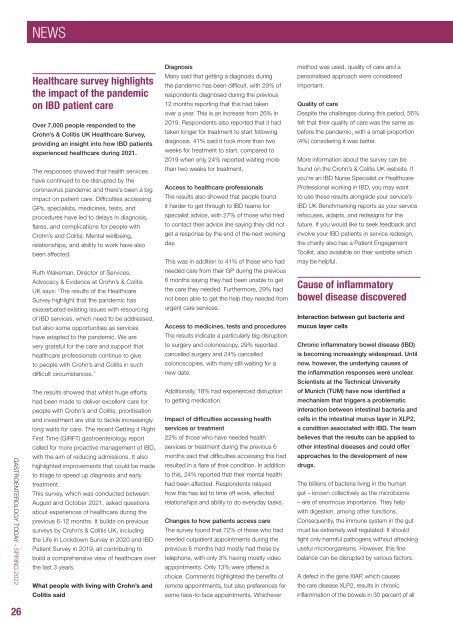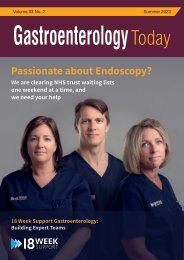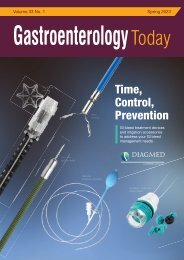Gastroenterology Today Spring 2022
Gastroenterology Today Spring 2022
Gastroenterology Today Spring 2022
You also want an ePaper? Increase the reach of your titles
YUMPU automatically turns print PDFs into web optimized ePapers that Google loves.
NEWS<br />
GASTROENTEROLOGY TODAY - SPRING <strong>2022</strong><br />
Healthcare survey highlights<br />
the impact of the pandemic<br />
on IBD patient care<br />
Over 7,000 people responded to the<br />
Crohn’s & Colitis UK Healthcare Survey,<br />
providing an insight into how IBD patients<br />
experienced healthcare during 2021.<br />
The responses showed that health services<br />
have continued to be disrupted by the<br />
coronavirus pandemic and there’s been a big<br />
impact on patient care. Difficulties accessing<br />
GPs, specialists, medicines, tests, and<br />
procedures have led to delays in diagnosis,<br />
flares, and complications for people with<br />
Crohn’s and Colitis. Mental wellbeing,<br />
relationships, and ability to work have also<br />
been affected.<br />
Ruth Wakeman, Director of Services,<br />
Advocacy & Evidence at Crohn’s & Colitis<br />
UK says: ‘The results of the Healthcare<br />
Survey highlight that the pandemic has<br />
exacerbated existing issues with resourcing<br />
of IBD services, which need to be addressed,<br />
but also some opportunities as services<br />
have adapted to the pandemic. We are<br />
very grateful for the care and support that<br />
healthcare professionals continue to give<br />
to people with Crohn’s and Colitis in such<br />
difficult circumstances.’<br />
The results showed that whilst huge efforts<br />
had been made to deliver excellent care for<br />
people with Crohn’s and Colitis, prioritisation<br />
and investment are vital to tackle increasingly<br />
long waits for care. The recent Getting it Right<br />
First Time (GIRFT) gastroenterology report<br />
called for more proactive management of IBD,<br />
with the aim of reducing admissions. It also<br />
highlighted improvements that could be made<br />
to triage to speed up diagnosis and early<br />
treatment.<br />
This survey, which was conducted between<br />
August and October 2021, asked questions<br />
about experiences of healthcare during the<br />
previous 6-12 months. It builds on previous<br />
surveys by Crohn’s & Colitis UK, including<br />
the Life in Lockdown Survey in 2020 and IBD<br />
Patient Survey in 2019, all contributing to<br />
build a comprehensive view of healthcare over<br />
the last 3 years.<br />
What people with living with Crohn’s and<br />
Colitis said<br />
Diagnosis<br />
Many said that getting a diagnosis during<br />
the pandemic has been difficult, with 29% of<br />
respondents diagnosed during the previous<br />
12 months reporting that this had taken<br />
over a year. This is an increase from 26% in<br />
2019. Respondents also reported that it had<br />
taken longer for treatment to start following<br />
diagnosis. 41% said it took more than two<br />
weeks for treatment to start, compared to<br />
2019 when only 24% reported waiting more<br />
than two weeks for treatment.<br />
Access to healthcare professionals<br />
The results also showed that people found<br />
it harder to get through to IBD teams for<br />
specialist advice, with 27% of those who tried<br />
to contact their advice line saying they did not<br />
get a response by the end of the next working<br />
day.<br />
This was in addition to 41% of those who had<br />
needed care from their GP during the previous<br />
6 months saying they had been unable to get<br />
the care they needed. Furthermore, 29% had<br />
not been able to get the help they needed from<br />
urgent care services.<br />
Access to medicines, tests and procedures<br />
The results indicate a particularly big disruption<br />
to surgery and colonoscopy. 29% reported<br />
cancelled surgery and 24% cancelled<br />
colonoscopies, with many still waiting for a<br />
new date.<br />
Additionally, 18% had experienced disruption<br />
to getting medication.<br />
Impact of difficulties accessing health<br />
services or treatment<br />
22% of those who have needed health<br />
services or treatment during the previous 6<br />
months said that difficulties accessing this had<br />
resulted in a flare of their condition. In addition<br />
to this, 24% reported that their mental health<br />
had been affected. Respondents relayed<br />
how this has led to time off work, affected<br />
relationships and ability to do everyday tasks.<br />
Changes to how patients access care<br />
The survey found that 72% of those who had<br />
needed outpatient appointments during the<br />
previous 6 months had mostly had these by<br />
telephone, with only 3% having mostly video<br />
appointments. Only 13% were offered a<br />
choice. Comments highlighted the benefits of<br />
remote appointments, but also preferences for<br />
some face-to-face appointments. Whichever<br />
method was used, quality of care and a<br />
personalised approach were considered<br />
important.<br />
Quality of care<br />
Despite the challenges during this period, 56%<br />
felt that their quality of care was the same as<br />
before the pandemic, with a small proportion<br />
(4%) considering it was better.<br />
More information about the survey can be<br />
found on the Crohn’s & Colitis UK website. If<br />
you’re an IBD Nurse Specialist or Healthcare<br />
Professional working in IBD, you may want<br />
to use these results alongside your service’s<br />
IBD UK Benchmarking reports as your service<br />
refocuses, adapts, and redesigns for the<br />
future. If you would like to seek feedback and<br />
involve your IBD patients in service redesign,<br />
the charity also has a Patient Engagement<br />
Toolkit, also available on their website which<br />
may be helpful.<br />
Cause of inflammatory<br />
bowel disease discovered<br />
Interaction between gut bacteria and<br />
mucus layer cells<br />
Chronic inflammatory bowel disease (IBD)<br />
is becoming increasingly widespread. Until<br />
now, however, the underlying causes of<br />
the inflammation responses were unclear.<br />
Scientists at the Technical University<br />
of Munich (TUM) have now identified a<br />
mechanism that triggers a problematic<br />
interaction between intestinal bacteria and<br />
cells in the intestinal mucus layer in XLP2,<br />
a condition associated with IBD. The team<br />
believes that the results can be applied to<br />
other intestinal diseases and could offer<br />
approaches to the development of new<br />
drugs.<br />
The billions of bacteria living in the human<br />
gut – known collectively as the microbiome<br />
– are of enormous importance. They help<br />
with digestion, among other functions.<br />
Consequently, the immune system in the gut<br />
must be extremely well regulated: It should<br />
fight only harmful pathogens without attacking<br />
useful microorganisms. However, this fine<br />
balance can be disrupted by various factors.<br />
A defect in the gene XIAP, which causes<br />
the rare disease XLP2, results in chronic<br />
inflammation of the bowels in 30 percent of all<br />
26

















